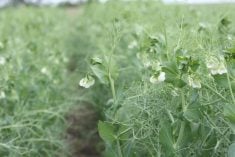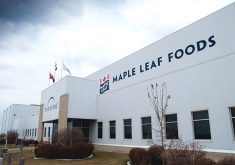Glacier FarmMedia – The executive chair of one of Canada’s largest food manufacturers has outlined his company’s plans for a “new model for capitalism,” underpinned by sustainability.
Speaking at the Sustainability of Canadian Agriculture 2025 virtual conference in early March, Michael McCain, Maple Leaf Foods’s former chief executive officer, laid out what he says are guiding principles his company believes will bring it closer to being “most sustainable protein company on Earth.”
The first principle is serving all stakeholders, not just shareholders, McCain told listeners.
Read Also

StatCan stands by its model-based crop forecast
Statistics Canada’s model-based production estimates are under scrutiny, but agency says it is confident in the results.
“We serve all of our stakeholders — including the shareholders — and we reject the overt primacy of shareholders,” he said.
“Importantly, we recognize our natural environment as a vital stakeholder in our company.”
The second — horizon — rejects the “hypnotic allure of short-termism” in favour of longer term thinking.
“It’s virtually impossible to create a sustainable economy with the tunnel vision of a short-term lens. I believe a new model of capitalism should adopt specific tools to make this an easier prospect,” he said.
The third is advocacy on matters important to society and not just “narrow corporate interests.”
“That means taking positions as an organization on relevant social topics, even if it runs the risk of alienating some people. A new model of capitalism would embed this kind of social commitment.”
McCain said Maple Leaf has a goal of connecting these defining features to its financial success over time “so that we don’t force that existential trade-off between virtue and money.”
“That does not mean that we don’t keep an active, intense focus on our near-term financial performance. Of course we do that. It simply means that we embrace the magic of the word ‘and’ and reject the tyranny of the word ‘or,’ and we do so in pursuit of creating shared value for all stakeholders.”
That vision has required a lot of change in the past 10 years from a “conventional” meat company to one that McCain said is defined by advocacy, environmental sustainability, animal welfare and responsiveness to consumer concerns.
The company’s changes in the past decade have included early adoption of group sow housing, following a national directive to industry to move away from gestation crates, and moves to reduce energy use and waste while making improvements to other environmental metrics. In 2019, with a boost from carbon offset projects, the company declared itself carbon neutral.
The company’s website includes a goal to reduce carbon emissions by another 30 per cent by 2030, compared to its levels in 2018.
McCain also pointed to a campaign to eliminate all ingredients that consumers wouldn’t find in their pantries and establishing the Maple Leaf Centre for Food Security. The same policies that created environmental effiiciencies also cut production costs, he noted, a win-win for the company.
A big part of the shift involved tackling industry weaknesses and consumer complaints head on rather than ignoring them, McCain said.
“Increasingly, the food industry, and especially the meat sector, are at the epicentre of critical environmental and social issues. The global food system generates nearly a quarter of all greenhouse gas emissions,” he said.
“Livestock production, especially cows and other ruminants, contributes over 14 per cent of that. Agriculture uses almost half of the world’s vegetated land and consumes 70 per cent of the fresh water used.”
He cited other issues including food waste, antibiotic use in livestock, nutritional concerns over obesity and food insecurity.
The mounting issues force the company into self-reflection, he said.
“First, it’s virtually impossible to be a thriving, sustainable enterprise while ignoring the degradation of the environment, animal welfare and human health. The future is integrally tied to the health and wellness of the ecosystems and societies that we operate within,” he said.
“Second, purely from a risk perspective, there were reasons to act to protect and preserve our brands and our reputation. Trust is everything over time.”
Thirdly, the move actually created business value by providing solutions to some of the world’s critical issues and applying shared value creation, he said.
“Pioneering thought leaders define shared value creation as the policies and practices that enhance the competitiveness of a company while simultaneously advancing social and economic conditions in the communities in which they operate,” he said.
“In short, ESG (environmental, social and governance) has become more about risk and reputation management, where shared value creation is about actual problem solving for both commercial success and societal challenges.”
According to the ESG Centre of Excellence, ESG is “a comprehensive framework that looks at organizational impacts on the environment; the treatment of employees, stakeholders and community members; and addresses the quality of governance structures.”
Added McCain: “It was not balancing doing good; it was balancing doing good with doing business. It wasn’t about ticking ESG boxes for investors in public reporting.”
The result has been higher esteem for the company among job seekers, said McCain.
“We aren’t perfect by any stretch; any enterprise that holds themselves to (that) standard won’t likely get out of the starting blocks. It’s taken some measure of courage, deep, long-term commitment and a healthy dose of humility.”
Maple Leaf is currently looking at technologies such as anaerobic digestion and practices such as regenerative farming to further reduce its supply chain footprint, he said.
When asked how Maple Leaf plans to adapt to U.S. tariffs and a new world order of trade and alliances, McCain didn’t sugar-coat his answer: it’s going to hurt everyone, including his company.
He pointed out that Maple Leaf is a predominately Canadian business with only 7.5 per cent of its revenue coming from the U.S., but that 7.5 per cent is not insignificant.
The company is currently encouraging consumers and those within the company to join the “Buy Canadian” movement.
“So we hope to be able to offset some of that (tariff loss) through greater affinity for Canadian local supplies from a Canadian company,” he said.
“We have to see how that all shakes out.”


















